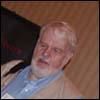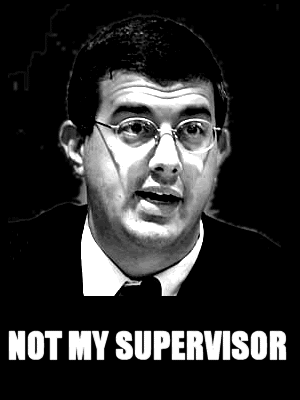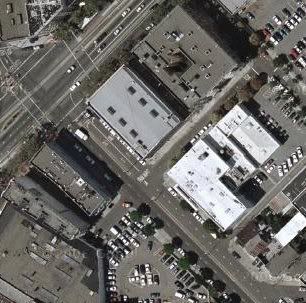
Supervisor Daly wants you to know that he knows what's best for you, even if it's exactly the opposite of what you think you want. Daly proved this beyond a doubt on June 6 of this year, when he voted against the will of his constituents, to kill the very crime-fighting tool they had asked him for.
For the past five years, San Franciscans in District 6 have been asking City Hall for surveillance cameras to be installed at the most crime-ridden areas of public spaces. Civic Center Plaza, the intersection of Ellis and Jones, Sixth and Mission and a few other areas have been openly -- brazenly -- used for criminal activity for years now. The Police respond to complaints when they're called, but that only causes the criminals to move away or cease their activity until the Police have left, at which point, they return and resume.
Surveillance cameras are
not new to San Francisco. We have had them mounted on BART, MUNI, in libraries and other civic buildings, in community centers and schools for many years now. They have proven their effectiveness in both reducing criminal activity and in helping law enforcement collar and convict criminals. Nor are they new to the City's public spaces. The four traffic intersections that use automatic cameras to catch red-light runners issue more than a thousand tickets every year. Cameras and videotape recorders are mounted in a few trouble-spots in the Bayview-Hunters Point area to catch people who illegally dump refuse on public property. They are an unequivocal success.
And cameras recently mounted above sidewalks in the Bernal Heights area have helped the Police catch Bennie Powell. Powell had been arguing with another man on the 900 block of Ellsworth St. near Alemany this April, when he pulled out a handgun and shot at the other man. He missed, but the bullet hit a 13 year-old girl who was nearby. The camera caught Powell, and he was prosecuted and convicted partly on that evidence. Last July, two cameras were installed on Buchanan St. in the Western Addition; within 90 days, crimes in the area had gone down 30%. And the City is launching a new program with fifty cameras mounted around public housing projects to help make them safer for residents.
Fed up with the chronic crime in their area, residents, merchants and community groups in District 6 have asked time and again for the City to install surveillance cameras at the worst spots in the Tenderloin, Mid-Market corridor and South of Market areas. The City did some research, looked at the results of such cameras being used in other cities, and decided to go ahead with a pilot program. $275,000 was set aside in the budget for the pilot program. The Mayor supported it. The other Supervisors supported it. The Police supported it. It looked like a win-win situation.
Then came June 6, 2006. At the Board of Supervisors meeting that afternoon, Chris Daly voted to eliminate the funding for that program. An overwhelming
nine of the ten other Supervisors voted
against Daly, so thankfully his vote failed. So why did Daly oppose the cameras that his constituents wanted? Because Daly, like his pal Bruce Brugmann -- the founder, owner and editor of the San Francisco Bay Guardian -- thinks that surveillance cameras in public spaces violate a constitutional "right to privacy".
Brugmann wrote an op-ed titled "Put away the cameras" in which he argued that very thing. But, like so many of Brugmann's notions, it falls apart under scrutiny. For example, he writes "(Mayor Newsom) wants to put surveillance cameras — perhaps as many as 100 new surveillance cameras — all over the city, recording everything that happens in big swaths of public space, 24 hours a day." But the cameras that the public asked for and the Mayor arranged for, may be
recording 24 hours a day, but the tape wouldn't actually be
viewed unless a crime had been committed, and the tape would automatically loop every 72 hours, so that the previous tape would be recorded over. It's no more of a threat to privacy than footprints left on the beach that briefly record the footprints of passersby, then fade away.
Brugmann writes "there's no evidence that cameras deter crime." This is such an absurd lie that I am shocked Brugmann would even suggest it. Brugmann uses the situation in Britain to support his claims. But Britain is totally different from the US. Handguns are almost impossible to obtain, search and seizure laws are different, and surveillance cameras blanket all public areas, not just in the worst of areas. Apples and pineapples. In fact, surveillance cameras are already in use in American cities like Chicago, New York City, Washington DC and others, and in those cities, the verdict is unanimous: where there are cameras, crime has gone down. Furthermore, dozens of criminals have been prosecuted with footage from the cameras. Clearly, surveillance cameras
do deter crime
and help convict criminals.
Brugmann goes on to say "And in exchange for this dubious benefit, San Franciscans will give up an immense amount of privacy." But it is no one other than the law abiding citizens of San Francisco who are explicitly telling their elected officials that they are willing to exchange a measure of their "privacy" (such as one has while walking down a street) for the fear they feel from criminals who hang out on those streets. Shouldn't citizens be able to make those choices themselves? Daly says "no"; all of his opponents say "yes". And even the term "privacy" is misleading. "Privacy" is to be expected on private property; no one is suggesting otherwise. But in public, one inevitably gives up some privacy. If I do something in public within another's field of vision or earshot, I cannot expect that person to not see or hear it, whether they are an ordinary citizen, a criminal, a police officer or the Attorney General.
More absurdly still, Brugmann claims "Those videos could be considered public record in California — meaning stalkers, angry ex-spouses, and people planning violent crimes will have access to the daily movements of their potential victims." The notion that stalkers and plotting criminals would have access to Police videotapes (which are automatically erased every 3 days) to be able to see a person walking down the sidewalk strains the imagination of even the most paranoid. It's the most baseless fear-mongering imaginable; Brugmann only leaves off the claim that puppies and kittens will be sacrificed if the cameras go up.
The "civil liberties" angle begs a substantial question: if a police officer can view a criminal doing something illegal, and that evidence can be given in court as oral testimony -- which is subject to a slew of problems, from subjective interpretation to outright fabrication -- then wouldn't an objective recording device be a
better safeguard against police misconduct or criminals getting off the hook because an officer's testimony was incomplete? If a citizen witnesses a crime (say, Reginald Denny being beaten by cops) and videotapes it, self-professed "civil libertarians" seem to have no problem with that video being made. But stationary, automatic cameras? Somehow, we're expected to believe that they're more of a threat to our "right to privacy"? I don't buy it.
But apparently one person who does is Bruce Brugmann. Although the Guardian touts itself as "the conscience of the Left" in the Bay Area, it's more of a personal vehicle for Brugmann's notions about the way San Francisco should be: an ultra-"progressive" utopia devoid of any big business and off-limits to Republicans and other lower life-forms. Brugmann has used his paper to wage a one-man campaign (some would say "vendetta") against PG&E for the past two decades. If there's a kind word to describe Brugmann, I would suggest "prickly". Someone else might suggest "ultra-Left-wing paranoid demagogue". What would be more useful to such a person than a representative in the local government?
The 69 year-old Brugmann isn't without his own political inconsistancies and conflicts of interest. For example, Brugmann fought for as many years as he could to keep his printing facility non-union and his employees on a part-time basis, so he wouldn't have to pay benefits or relinquish any control (he still owns and operates the Guardian with his wife and son). And he also editorialized against increasing the tax on cigarettes in the 2002 election cycle because it supposedly would be a hardship for poor smokers, at the same time that cigarette advertisements were the most lucrative ads for the Guardian.
The Bay Guardian has heavily backed Chris Daly for the past 6 years, not only endorsing him in every election, but putting him on their cover last month. If you Google "Chris Daly" + Guardian, you'll get over 35,000 hits, which tells you something about the unique relationship between the two of them. But not everything. Because Brugmann also seems to see Daly as a sort of "little brother", showering him with fawning prose and attacking anyone who dares criticize Daly. And at the same time that the Guardian attacks any campaign literature criticizing Daly and/or endorsing Rob Black as being "illegal hit pieces", the Guardian incessantly promotes Daly, encouraging people not only to vote for him but to volunteer and make cash donations to his campaign (something that no other San Francisco paper would dare to do for any candidate they endorse). With free advertising like that, who needs PACs to donate flyers for your cause?
In his editorial about the surveillance camera program that Daly tried to kill, Brugmann ended the column thus: "
The best solution here is to simply cut the funding for the mayor's cameras from next year's budget." Is it a mere coincidence that this is precisely what Daly tried to do? Is it a coincidence that Daly advances Brugmann's causes so avidly at the same time that Brugmann acts as Daly's informal campaign vehicle, giving a priceless advantage at the polls? Perhaps more "sunshine" should be directed towards the collusion between Chris Daly and his media mouthpiece at the Guardian. Maybe the best place for a surveillance camera is in Bruce Brugmann's office.





